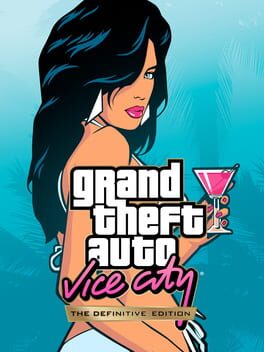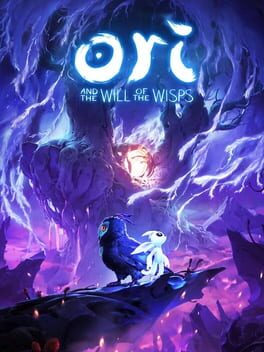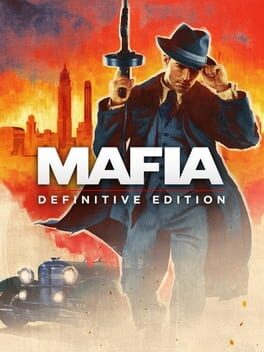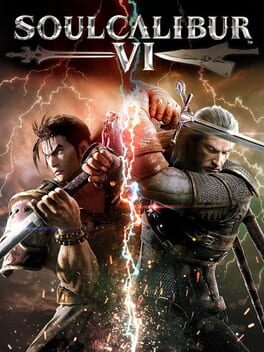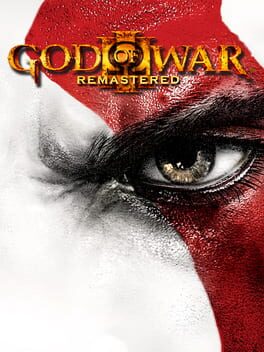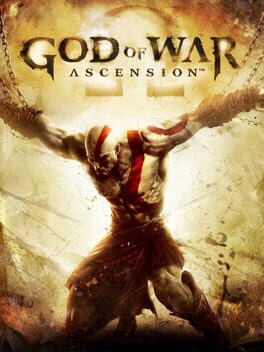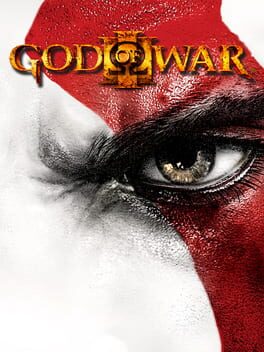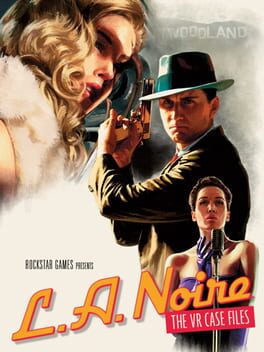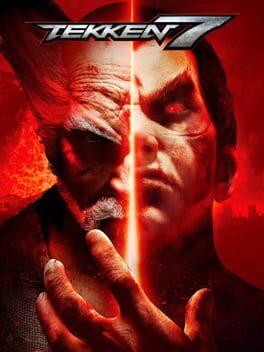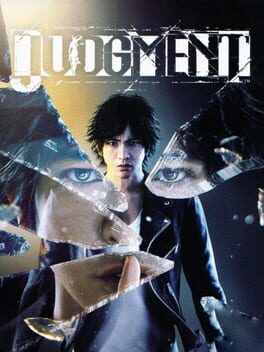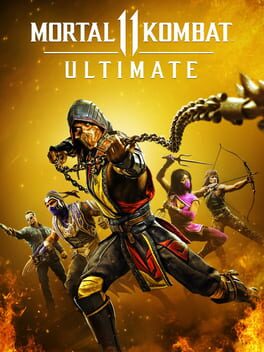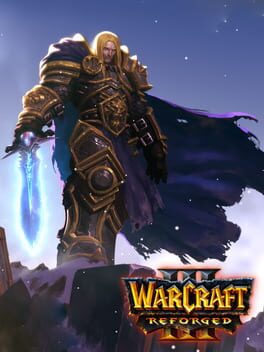x_manicure_x
Is Vice City still worth playing now? Probably not, even though I like how the missions are quick and immediate compared to later GTA's. I didn't mind the lack of in-mission checkpoints at first, but there were too many times I had to restart due to a bug or the NPC getting stuck in corners. Sometimes, it was hard to understand what I was supposed to do for some missions. I was hoping this Definitive Edition to improve the controls and fix some of the bugs, but it looks like things got even worse.
I am aware that many people are attached to this game as it was a major step forward for the series and showed the potential of open-world games, but it undeniably aged poorly. The plot is alright, but again nothing that will change your life or that I would consider worth revisiting if you have seen enough mob movies.
I am aware that many people are attached to this game as it was a major step forward for the series and showed the potential of open-world games, but it undeniably aged poorly. The plot is alright, but again nothing that will change your life or that I would consider worth revisiting if you have seen enough mob movies.
“Ori and the Will of the Wisps” obviously lacks the impact of the first game, but at the same time, it’s an improvement in most aspects and on a bigger scale. There are more abilities, better combat dynamics, and even a few side missions and challenges that reward upgrades for an easier experience. My only complaint is that I preferred the manual checkpoint system of the first game over the cozy autosave features of “Will of the Wisps”. I always thought that saving up your energy for creating checkpoints and managing the risks was part of the fun. Some of the bosses were also a little too hard if encountered too early in the game.
The graphics, art direction, story, and music are in line with the first game. Very simple but always manage to make me cry somehow.
The graphics, art direction, story, and music are in line with the first game. Very simple but always manage to make me cry somehow.
Mediocre remake. The graphics are pretty good, but the gameplay feels at least ten years old. Shooting and driving are somewhat stilted, and despite offering a big open world map, the only thing you can do is go ahead with the main story missions on a linear path. Free-roaming is available after completing the main game, but there isn’t much to do.
The plot is nothing exceptional if you have watched enough mob movies, but it’s arguably one of the best in this genre of video games even after eighteen years. Characters like Sarah could have been expanded a little, though.
The plot is nothing exceptional if you have watched enough mob movies, but it’s arguably one of the best in this genre of video games even after eighteen years. Characters like Sarah could have been expanded a little, though.
2018
“SoulCalibur VI” potentially offers hours of single-player content but gets boring in a few minutes due to its lazy presentation. There are two story modes, both made of fights with verbose dialogue over static illustrations in between, like in visual novel games. You also bump into a lot of randomly customized models instead of actual characters from the main roster. The Libra of Soul mode got me tired in a few chapters despite having some interesting RPG elements.
The combat feels slightly more fluid and spectacular compared to the previous game. My first few fights were a little clunky, but I got dramatically better after some practice. The rock-paper-scissor mechanics were a potentially terrible idea, but the slow-motion definitely managed to add some tension. The game also happens to be a soft reboot of the first Soul Calibur, or I should say a huge excuse to bring back the fan-favorite characters and answer to the complaints on the Soul Calibur V roster.
It still feels a little dated in comparison to other top-tier fighting games of the same generation, but it could be fun to play once in a while with friends.
The combat feels slightly more fluid and spectacular compared to the previous game. My first few fights were a little clunky, but I got dramatically better after some practice. The rock-paper-scissor mechanics were a potentially terrible idea, but the slow-motion definitely managed to add some tension. The game also happens to be a soft reboot of the first Soul Calibur, or I should say a huge excuse to bring back the fan-favorite characters and answer to the complaints on the Soul Calibur V roster.
It still feels a little dated in comparison to other top-tier fighting games of the same generation, but it could be fun to play once in a while with friends.
“God of War II” brings the formula of the first two games to Play Station 3 with minor variations but with a much more epic sense of scale. There is really nothing we haven't already seen in the previous games, but the graphic upgrades, the fluidity of the gameplay, and the epic boss fights are enough to make it the pinnacle of the series before the soft-reboot in 2018. It’s almost a boss rush with a bunch of puzzles in between, but the pleasure of slaying all Greek gods one after another is just tempting to resist. All the weird puzzles and frustrating platformer sections have been highly improved, but on the other hand they will hardly offer any challenge. The first boss fight with Poseidon right at the beginning of the game was enough to make me proud of having a Play Station 3 in my living room.
The plot has never been the strongest point of the franchise, and this game makes no exception. It picks up from the cliffhanger of “God of War II” and continues the same revenge story with no major surprises.
The plot has never been the strongest point of the franchise, and this game makes no exception. It picks up from the cliffhanger of “God of War II” and continues the same revenge story with no major surprises.
“God of War: Ascension” is supposed to work as a prequel to the franchise, but does not offer anything. The combat system might be the most polished so far, but the plot, enemies and level design are quite mediocre if compared to the previous chapters. We don't even learn anything new about Kratos and his past. The first boss fight reaches jaw-dropping heights, but everything afterward just felt flat and uninspired in contrast.
2010
“God of War II” brings the formula of the first two games to Play Station 3 with minor variations but with a much more epic sense of scale. There is really nothing we haven't already seen in the previous games, but the graphic upgrades, the fluidity of the gameplay, and the epic boss fights are enough to make it the pinnacle of the series before the soft-reboot in 2018. It’s almost a boss rush with a bunch of puzzles in between, but the pleasure of slaying all Greek gods one after another is just tempting to resist. All the weird puzzles and frustrating platformer sections have been highly improved, but on the other hand they will hardly offer any challenge. The first boss fight with Poseidon right at the beginning of the game was enough to make me proud of having a Play Station 3 in my living room.
The plot has never been the strongest point of the franchise, and this game makes no exception. It picks up from the cliffhanger of “God of War II” and continues the same revenge story with no major surprises.
The plot has never been the strongest point of the franchise, and this game makes no exception. It picks up from the cliffhanger of “God of War II” and continues the same revenge story with no major surprises.
2018
“God of War” is a welcome soft-reboot of a franchise that started to grow stale after “Ascension”.
The early portions of the game are disorientingly relaxed, with Kratos enjoying nature walks and boat trips in an open map full of collectibles and even a bunch of side-quests. We have skill trees to unlock, equipment to upgrade, and materials to collect like in an action RPG.
The combat system has a considerably slower pace and lower number of enemies on screen, but got more technical and varied. Atreus works as a supporting character: his bow and arrows being incredibly useful, and his warnings help you avoiding damage on several occasions. However, I was disappointed by the little variety of enemies: we have the same few monsters rehashed throughout the game in different colors and elements (fire/ice). We are also missing the epic boss fights, with creatures first introduced as mid-bosses usually becoming regular enemies as we progress.
It's hard to think of it as a traditional "God of War" entry, but I can't deny that I enjoyed the experience. The focus on narration and world-building gave a new depth to the series, and technically we are obviously in front of one of the greatest technical achievements on Play Station 4. After a dozen hours, the gameplay and plot start to get a little repetitive, but the action eventually kicks in with new locations, additional weapons, and faster plot development until we finally reach an epic final boss in true "God of War" spirit.
The early portions of the game are disorientingly relaxed, with Kratos enjoying nature walks and boat trips in an open map full of collectibles and even a bunch of side-quests. We have skill trees to unlock, equipment to upgrade, and materials to collect like in an action RPG.
The combat system has a considerably slower pace and lower number of enemies on screen, but got more technical and varied. Atreus works as a supporting character: his bow and arrows being incredibly useful, and his warnings help you avoiding damage on several occasions. However, I was disappointed by the little variety of enemies: we have the same few monsters rehashed throughout the game in different colors and elements (fire/ice). We are also missing the epic boss fights, with creatures first introduced as mid-bosses usually becoming regular enemies as we progress.
It's hard to think of it as a traditional "God of War" entry, but I can't deny that I enjoyed the experience. The focus on narration and world-building gave a new depth to the series, and technically we are obviously in front of one of the greatest technical achievements on Play Station 4. After a dozen hours, the gameplay and plot start to get a little repetitive, but the action eventually kicks in with new locations, additional weapons, and faster plot development until we finally reach an epic final boss in true "God of War" spirit.
2015
The first and last eighth-generation main entry of the Tekken series guarantees fluid combat at stable 60fps and endless hours of multiplayer fun for competitive players. However, it didn't feel like a big generational leap from the previous chapters. I know that most players just play online nowadays, but I wish they would put some more effort into offline content as well.
Tekken always had a ridiculous story, but the campaign this time ranks amongst the laziest and worst-written in videogame history, which is kind of sad, as this was supposed to mark the final chapter of the Mishimas storyline. I was also very disappointed to notice that there is no Team Battle mode this time.
Other than that, it's just another Tekken entry with the same qualities and flaws. Rage Arts have been introduced as some kind of special move to turn the tide in a critical situation. However, unlike Mortal Kombat's "X-Ray" attacks, they have very little visual impact and actually end up slowing down the gameplay.
Tekken always had a ridiculous story, but the campaign this time ranks amongst the laziest and worst-written in videogame history, which is kind of sad, as this was supposed to mark the final chapter of the Mishimas storyline. I was also very disappointed to notice that there is no Team Battle mode this time.
Other than that, it's just another Tekken entry with the same qualities and flaws. Rage Arts have been introduced as some kind of special move to turn the tide in a critical situation. However, unlike Mortal Kombat's "X-Ray" attacks, they have very little visual impact and actually end up slowing down the gameplay.
2017
All in all, it was a more than decent hack and slash with JRPG elements and curious shoot 'em up sections to spice things up. Interesting how the camera angles change in the middle of the campaign to give a whole new feeling to the gameplay. Platinum Games made sure to provide engaging combat with fluid animations and a stable frame rate, but little to no strategy is required on standard difficulty. Harder settings obviously offer more challenge for the player, but also make the gameplay quite tedious as it's the exact same mechanics with increased enemy health and damage.
Graphics are a little washed out and closer to a PS3 generation game, but still manage to conceive a unique and personal look. The whole game is set in the same open-world map, but the post-apocalyptic setting offers little detail and repetitive patterns within the same macro-areas. The most fascinating places are the smaller ones, like the machine village, the forest, the amusement park, and the copied city. The main campaign keeps asking you to go back and forth the same areas, but it was never a problem as the combat is fun, the story is interesting, and the background music is always good. Side missions tend to be a little more tedious, as they are primarily fetch-quests or extra backtracking just for the sake of it. After fast travel is unlocked, it just becomes a series of loading screens with a couple of dialogues in between.
I can't really see how the storytelling could be innovative, but it does deal with themes that are not so recurrent in recent video games. It may appeal to people who enjoyed "Ghost in the Shell", "Neon Genesis Evangelion" and the likes. I am aware the game didn't have a huge budget, but a better direction in the cutscenes and more fleshed-out dialogues could have helped to explore the plot and characters a little more. Like in the "Kingdom Hearts" saga, there are references to the previous games and other related media, but what can be actually found in-game is pretty basic.
I also didn't like how they force you to play the first half of the campaign twice to unlock the rest of the story. Nothing against replaying the same game with different characters and learning a few more details, but these should be facultative tasks to complete after the endgame.
Despite the rough edges and budget limitations, it was still an enjoyable game able to provide something different from its competitors. I am pretty interested in "Replicant" as it seems more plot-focused than "Automata", but I am not sure I want to beat the campaign four times to get to the ending.
Graphics are a little washed out and closer to a PS3 generation game, but still manage to conceive a unique and personal look. The whole game is set in the same open-world map, but the post-apocalyptic setting offers little detail and repetitive patterns within the same macro-areas. The most fascinating places are the smaller ones, like the machine village, the forest, the amusement park, and the copied city. The main campaign keeps asking you to go back and forth the same areas, but it was never a problem as the combat is fun, the story is interesting, and the background music is always good. Side missions tend to be a little more tedious, as they are primarily fetch-quests or extra backtracking just for the sake of it. After fast travel is unlocked, it just becomes a series of loading screens with a couple of dialogues in between.
I can't really see how the storytelling could be innovative, but it does deal with themes that are not so recurrent in recent video games. It may appeal to people who enjoyed "Ghost in the Shell", "Neon Genesis Evangelion" and the likes. I am aware the game didn't have a huge budget, but a better direction in the cutscenes and more fleshed-out dialogues could have helped to explore the plot and characters a little more. Like in the "Kingdom Hearts" saga, there are references to the previous games and other related media, but what can be actually found in-game is pretty basic.
I also didn't like how they force you to play the first half of the campaign twice to unlock the rest of the story. Nothing against replaying the same game with different characters and learning a few more details, but these should be facultative tasks to complete after the endgame.
Despite the rough edges and budget limitations, it was still an enjoyable game able to provide something different from its competitors. I am pretty interested in "Replicant" as it seems more plot-focused than "Automata", but I am not sure I want to beat the campaign four times to get to the ending.
2015
Don't get fooled by the outdated graphics or the hipster fanboys overpraising it: "Undertale" might not be a masterpiece, but it definitely goes beyond being a mere old-school JRPG pastiche with psychedelic quirks and meta-references. It's the perfect example of how a no-budget bedroom project can entertain and tugs at your heartstrings more than a AAA game if built with good taste and passion.
Even if highly derivative of the "Earthbound" series in tone, it deconstructs JRPG story-telling and clichés in its own original and compelling manner. It starts off as the lighthearted parody of one of the most stereotyped plots in history, but darker revelations that might even lead you to question your approach to videogames await at the end. However, I have to admit that despite the engaging beginning and the heartfelt ending(s), the middle section is a little dull. In particular, the whole part with Dr. Alphys and her robot was a little too tedious with the same jokes repeated all over again.
The combat mixes traditional turn-based actions with bullet hell kind-of mechanics for dodging. The fun part is that each enemy offers completely different mechanics and patterns, to the point that each fight can be considered as a separate minigame.
Even if highly derivative of the "Earthbound" series in tone, it deconstructs JRPG story-telling and clichés in its own original and compelling manner. It starts off as the lighthearted parody of one of the most stereotyped plots in history, but darker revelations that might even lead you to question your approach to videogames await at the end. However, I have to admit that despite the engaging beginning and the heartfelt ending(s), the middle section is a little dull. In particular, the whole part with Dr. Alphys and her robot was a little too tedious with the same jokes repeated all over again.
The combat mixes traditional turn-based actions with bullet hell kind-of mechanics for dodging. The fun part is that each enemy offers completely different mechanics and patterns, to the point that each fight can be considered as a separate minigame.
2018
"Judgment" could have been a new spin on the usual RGG Studio formula, but unfortunately, it's just one more "Yakuza" game disguised as a new IP. As always, we get great cutscenes and a complex, over-the-top mafia conspiracy story full of plot twists, but the gameplay is stuck in Yakuza's PS3 days. The only difference is that we are now impersonating a retired lawyer who works as a private detective. We can investigate areas, collect clues, tail suspicious people, wear disguises, lock-pick to infiltrate areas, but none of these mechanics has been fleshed out properly. Sometimes I wish they would just make a smaller game and choose quality over quantity. For example, I would prefer a dozen side quests with acted dialogues instead of 40 with walls of text to read like in old-school RPGs.
Definitely worth playing for the plot, though. Takuya Kimura notoriously sucks at acting, but he is at least better than Kiryu's voice actor in "Yakuza". Except for a couple of supporting characters like Saori or Shintani, the character models look quite realistic, and the voice acting and dialogue writing are consistently good for a videogame.
Hopefully, the sequels will expand the investigation mechanics and provide something different.
Definitely worth playing for the plot, though. Takuya Kimura notoriously sucks at acting, but he is at least better than Kiryu's voice actor in "Yakuza". Except for a couple of supporting characters like Saori or Shintani, the character models look quite realistic, and the voice acting and dialogue writing are consistently good for a videogame.
Hopefully, the sequels will expand the investigation mechanics and provide something different.
It doesn't have the same impact as the 2011 soft reboot, but it's definitely the best Mortal Kombat experience possible both in terms of atmosphere, character design, direction, and gameplay. Combat got incredibly fluid and the graphic upgrade is obvious especially in the environments. Mortal Kombat X's plot and roaster was not my cup of tea with all those new kids taking lead, but they found a way (excuse) to fix things and bring back fan-favorite fighters once more. Customization content is massive, but unfortunately needs to be unlocked by grinding which makes the experience a little frustrating. I liked walking around the Krypt and unlocking contents to a certain extent but I am not planning to spend all my limited free time on this game.
As back in the day I was neither clever nor patient enough to clear the "Warcraft III" story campaign, I gave it one more try with this remake. Too bad that this time I had to give up again due to the bugs. The Mac version keeps freezing while saving every now and then. Other than that, I can’t understand all the hate as this is a carbon copy remake of the original (you can even switch back to the original graphics). The graphic overhaul is alright, even though a little cartooney for my taste. As with the original, I loved the wide variety of civilizations you can choose from, as well as the narrative world created by Blizzard for this title. The bigger focus on the story and expansion of the game contents was a big deal and a huge upgrade from "Warcraft II", and despite the not too friendly user interface the game still holds pretty well.
